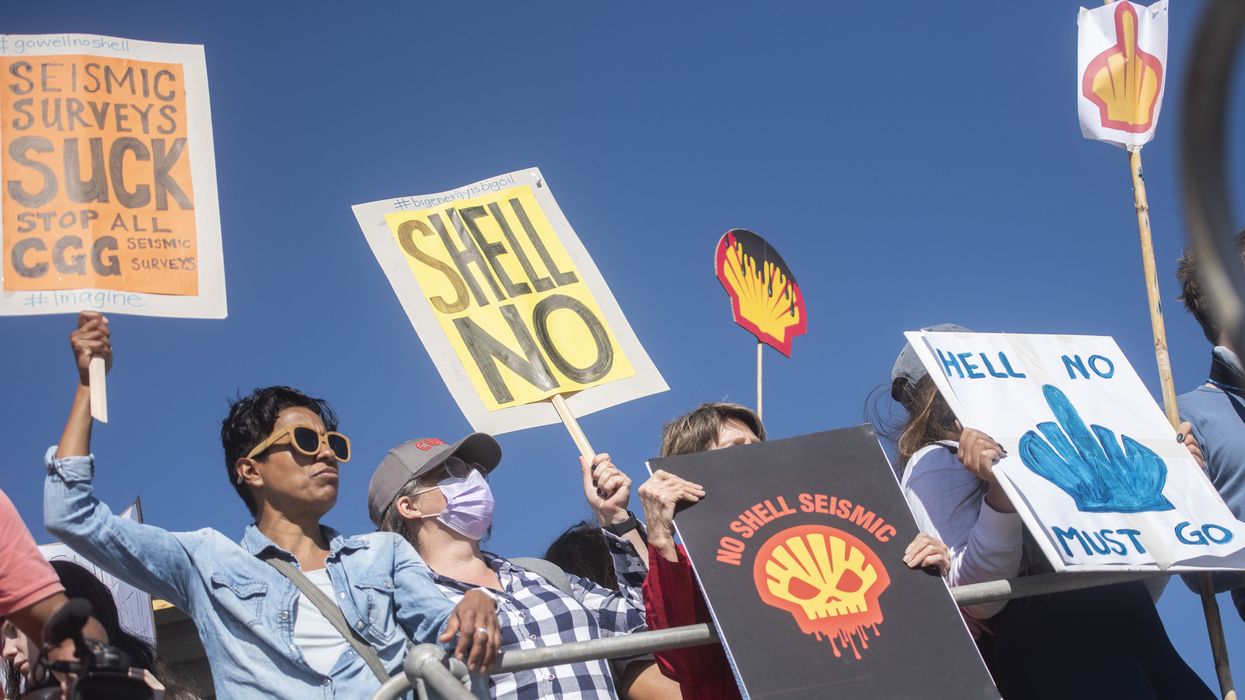Think also of the water and chemicals used in the construction and maintenance of stadia, the electricity needed to watch matches and bet or report electronically on them, and the impact of tourism.
Sponsorship by companies with high CO2 emissions alone is responsible for 75% of sports emissions, as it stimulates demand for highly polluting products and lifestyles. The large eco-laundering multinationals use football to cover up their environmental shame. For example, shortly after Repsol spilled thousands of barrels of oil on 1,400 hectares of Peru’s Pacific coast in 2022, killing native life and destroying the livelihoods of thousands of people, the company signed a sponsorship with the national team. The motto of the project, also associated with supporting youth and women's representatives, was “Let's look to the future.” In Spain, Repsol and Petronor have signed an agreement to supply renewable energy to Athletic Club de Bilbao that supposedly demonstrates the multinational’s commitment to decarbonization. But the UK’s Advertising Standards Authority found Repsol distorted its environmental commitment by highlighting production of synthetic fuels and biofuels, which only account for a small fraction of its core business—fossil fuels.
Instead of greenwashing and pseudo-reforms, football needs a drastic transformation to disrupt its environmental impact, corruption, systematic human rights violations, sponsorship by highly problematic companies, and money laundering by bookmakers.
Qatar’s bid for the 2022 World Cup in 2009 promised to be CO2-neutral. The damage caused by constructing facilities, desalination, and water use in an arid climate would be offset because, according to the organizers, future generations would enjoy the facilities. There is no evidence for that.
As we all know, the candidacy was successful, despite evidence of vote buying. Implementation resulted in total disregard for labor and human rights: massive exploitation of migrant workers, workplace accidents, derisory wages, and impossible working hours. The pollution generated by air conditioning stadia to withstand Qatar’s climate, as well as the 150 daily flights of attendees, confirm the New Yorker’s verdict: FIFA is “a rancid institution.”
600 million trees would have to be planted to counter the climate calamity caused by Qatar 2022. Despite the trademark Sustainable FIFA World Cup 2022TM, the environmental plundering of the event was greater than that of any other World Cup or Summer Olympics. As usual, the United States provided the largest number of international tourists, which resulted in the emission of 191,055 tons of CO2, including a staggering 14,700 tons produced by private jets.
Le Monde exposed the environmental propaganda as a “mirage.” Scientific American called the event a “climate catastrophe.“ This was “the dirtiest World Cup“ in history, bathed in oil and corruption. The French collective Notre Affaire à Tous explained: “By presenting the World Cup as carbon neutral, FIFA makes [...] fans believe attending such an event has no impact on the environment, which is clearly incompatible with the international World Cup travel that affects greenhouse gas emissions.”
The Swiss Commission for Equity received complaints from Notre Affaire à Tous along with Carbon Market Watch (Belgium), the UK’s New Weather Institute, Alliance Climatique (Switzerland), the Netherlands’ Reclame Fossiettvrij, and Fossil Free Football (international). The commission ruled FIFA had lied by claiming the cup was the first event of its kind to be “totally carbon neutral.”
The 2026 men’s World Cup is expanding to include 48 national teams. For the first time, matches will be held in three huge countries: Canada, Mexico, and the United States, across four time zones, in 16 venues separated by several thousand kilometers, each with derisory public transport. Five and a half million spectators are expected, who will need to use the map to locate the venues: Mexico City will mark the southernmost point, Vancouver the north, Boston the east, and San Francisco the west. In terms of logistics, practically all travel will be by air due to a primitive railway infrastructure. Radio France refers to this as a “very carbonated cocktail.” The New Weather Institute with Scientists for Global Responsibility estimates that aviation emissions “will increase by 160% to 325% in each of the three tournaments in 2026, 2030, and 2034” compared to recent World Cups.
In addition, in the scheduled period—midsummer—96% of the US population experienced extreme heat for one or more weeks in 2023, and 45 cities had very high average temperatures. 2024 broke numerous records due to unprecedented drought and rainfall.
The environmental impacts in Mexico are horrific. The Akron stadium is close to the Primavera de Guadalajara reserve, home to pumas, a near-extinct species, deer, golden eagles, and migratory birds. The conservation of wild fauna and flora is at serious risk due to the World Cup, while the presence of 50,000 spectators and 4,000 cars will cause significant tensions in water resources in Mexico City and Monterrey (also next to a key biological corridor).
The World Cup is “simultaneously the greatest sporting festival on the planet and a sordid commercial machine that carries an enormous human and environmental cost, for the benefit of torturers, exploiters, and insatiable greedy.” Ecology only matters in football as an instrument of public image for the governing associations, host countries, and sponsors.
Instead of greenwashing and pseudo-reforms, football needs a drastic transformation to disrupt its environmental impact, corruption, systematic human rights violations, sponsorship by highly problematic companies, and money laundering by bookmakers. The World Cup's claims of carbon neutrality are just rhetoric. In reality, it has become a “greenwashing World Cup.”
We’re football fans who see no alternative: The CO2 party must end.
Abolish the World Cup!




